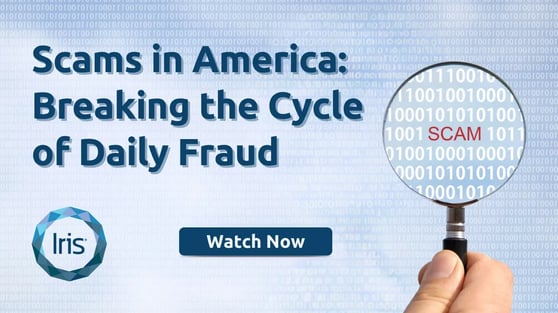Estimated Reading Time: 3 Minutes
Perhaps the biggest headline from the Global Anti-Scam Alliance’s report (sponsored by Iris® Powered by Generali) is that scams are no longer occasional threats – they’ve become a part of daily life. Americans now face an average of 377 scam attempts every year. That’s more than one every single day!
In an era where 70% of Americans are victimized by scams, the question isn’t whether your customers will face fraud attempts, but how prepared they’ll be when they do.
Iris partnered with GASA to host Scams in America: Breaking the Cycle of Daily Fraud, a panel discussion featuring experts from GASA, Mastercard, Aspen Institute, and The Media Trust. This timely panel discussion explored the collaborative strategies, advanced fraud detection technologies, and consumer education initiatives needed to combat the fraud and scam epidemic affecting millions of Americans.
Whether you’re looking to strengthen your organization’s scam prevention protocols or empower your customers with fraud protection resources, the insights from this conversation offer actionable guidance for breaking the cycle of daily.
Key Takeaways from Scams in America: Breaking the Cycle of Daily Fraud
If you missed this discussion – or want to revisit key moments – here are a few key takeaways revealed in the conversation:
Scam prevention is a shared responsibility
While 81% of Americans feel confident in spotting scams, experts emphasized that no single entity – tech platforms, financial institutions, government, or consumers themselves – can solve this alone. Success requires collaboration across all sectors, with each playing a critical role in prevention strategies and recovery support.
The importance of pausing before acting
Panelists stressed that legitimate organizations rarely require urgent action, especially when it comes to sending/receiving money. Everyone should take time to verify the source, talk with friends and family, and question offers that seem too good to be true to help prevent victimization.
Advanced technology and consumer education must work hand-in-hand.
Panelists agreed that innovations like MFA, AI-powered fraud detection, and identity monitoring provide essential protections; however, experts emphasized that technology reaches its full potential when paired with informed consumers. Openly discussing scam tactics, sharing scam experiences without shame, and reporting incidents create a collective defense that weakens scammers’ effectiveness. When consumers understand how to use protective tools and how to recognize evolving threats, we create an environment where fewer people fall victim.
If you missed the live event, you can watch the full recording on-demand on Iris' YouTube channel to hear expert perspectives on fighting scams, protecting consumers, and building more secure digital ecosystems.
The Fight Against Scams & Fraud Requires More Than Awareness
The fight against scams and fraud requires more than awareness – it demands action, collaboration, and the right resources. As businesses, we have both the responsibility and opportunity to empower consumers with the tools and knowledge they need to recognize scams, verify suspicious messages and requests, and protect themselves from financial fraud.
By combining advanced fraud detection technology with accessible consumer education, together, we can create a digital environment where protection is the default, not the exception.
Ready to strengthen your customers’ fraud and scam protection strategy? Visit our interactive CAM resource hub for cybersecurity educational materials, identity protection tools, and insights to help you safeguard your customers against evolving scam tactics.
Together, we can break the cycle of daily fraud and build more secure digital ecosystems for everyone.



.png?width=102&height=102&name=Iris-Generali-Logo-White%20(1).png)




